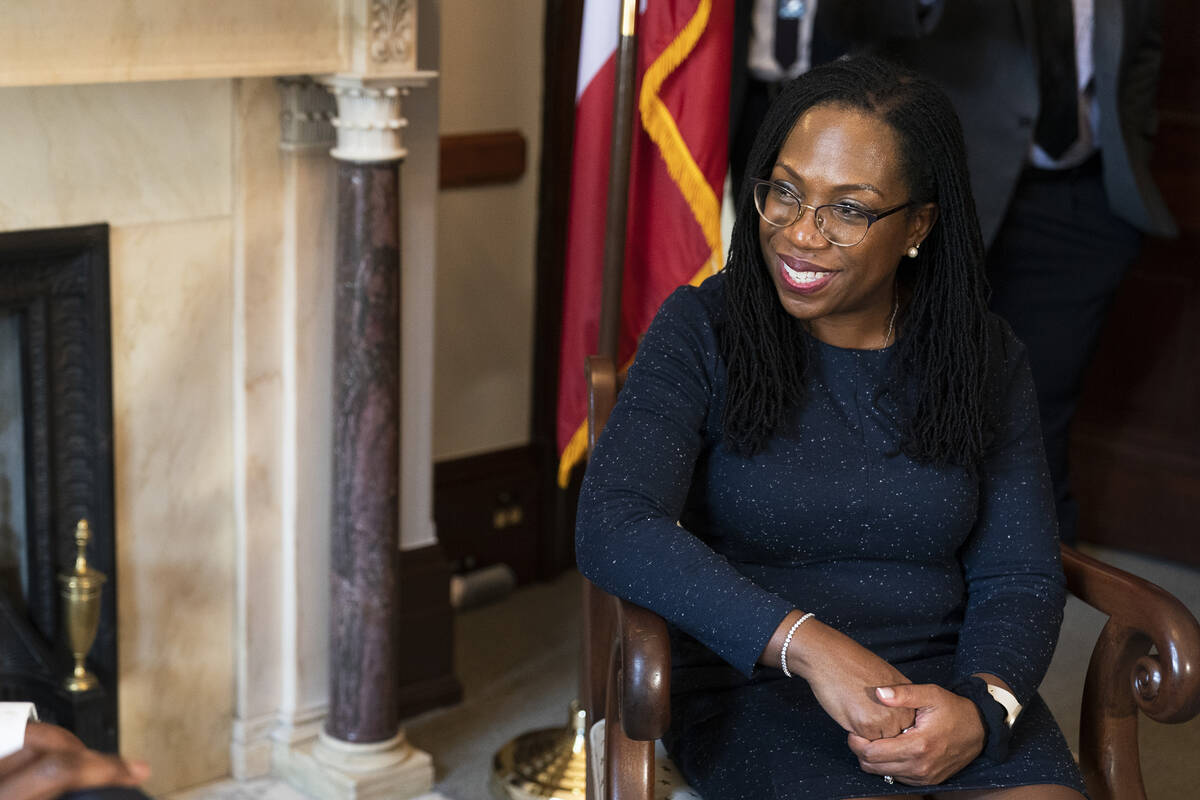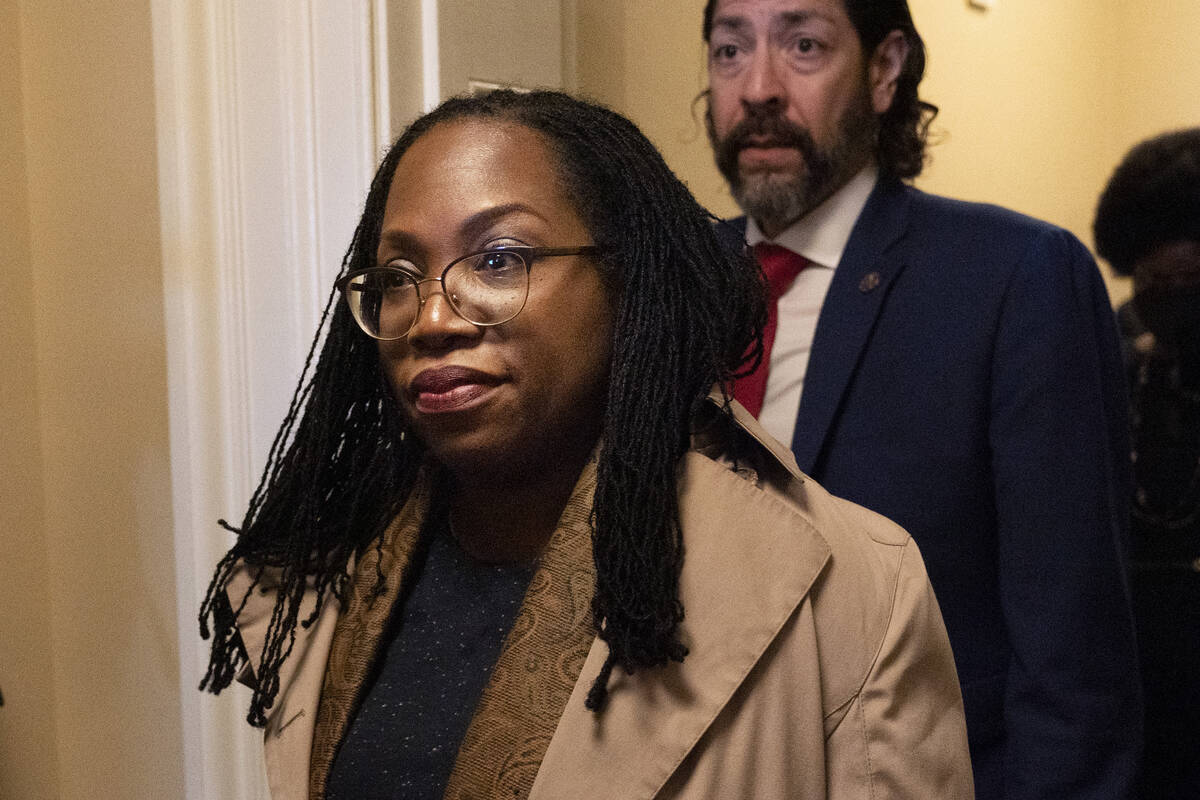Senate prepares for historic Supreme Court confirmation hearing
WASHINGTON — Judge Ketanji Brown Jackson will make history Monday, when she becomes the first Black woman to sit before a U.S. Senate confirmation hearing to serve on the Supreme Court.
Jackson, 51, has impeccable credentials and a resume full of experience that makes her well qualified to sit on the highest court in the land, Democrats and Republicans agree. She’s a former clerk for Justice Stephen Breyer, the man she may replace, and has experience as a public defender, a federal District Court judge and a judge of the U.S. Circuit Court of Appeals for the Washington, D.C. Circuit.
But the political stakes of a lifetime appointment and a nomination during an election year, where Republicans are poised to possibly take back Congress from Democrats, virtually guarantees a bright spotlight — and an opportunity for Jackson.
“These televised hearings will give millions of Americans a chance to hear from the judge directly for the first time since her nomination,” said Senate Majority Leader Chuck Schumer, D-N.Y.
Of the 115 Supreme Court justices in the nation’s history, only five have been women. There have been just two African American justices, Thurgood Marshall and Clarence Thomas. “Never has an African American woman come before the Judiciary Committee for consideration for the highest court,” Schumer said.
Confirmation appears likely in a Democrat-controlled Senate, but Republicans said they plan to delve into Jackson’s past judicial rulings, experience as a public defender and her views on college admissions when the hearing begins on Monday morning.
“It will be a serious and dignified process,” said Senate Minority Leader Mitch McConnell, R-Ky. Republicans vividly remember the chaos of the hearings for Justice Brett Kavanaugh in 2018, when Democrats brought up allegations of an alleged sexual assault from Kavanaugh’s high-school days, and they’ve vowed not to engage in similar tactics now.
Attacking the record
Nevertheless, Republicans have found issues on which to attack Jackson’s record. Sen. Josh Hawley, R-Mo., took to Twitter last week to claim Jackson, as a federal district judge, was soft on child pornography offenders. “Sending child pornographers to jail shouldn’t be controversial,” he wrote.
That claim drew a stiff rebuke from the White House, where spokeswoman Jen Psaki said Hawley took a “snippet of transcript out of context.” She said Jackson comes from a law enforcement family and is endorsed by grounds including the Fraternal Order of Police.
Republicans are also likely to target President Joe Biden, who pledged to nominate a Black woman to the high court during the 2020 campaign, a vow some say helped him win the Democratic primary in South Carolina that ended an earlier string of losses in Nevada, New Hampshire and Iowa. GOP lawmakers, including McConnell, have said announcing a racial preference for selecting a Supreme Court justice was inappropriate.
But Democrats point to President Donald Trump’s vow to appoint pro-life, conservative jurists vetted by the Federalist Society, a litmus test, albeit not one based on race.
There has been a historical lack of racial diversity in justices appointed to the high court, judicial experts agree.
Senate Democrats have applauded that aspect of Biden’s pick.
“I’ve always said that government should reflect the diversity of people of the United States, and Judge Jackson’s nomination to the Supreme Court is historic and important,” said Sen. Catherine Cortez Masto, D-Nev., the first Latina to serve in the Senate.
Partisan rancor
Although Republican and Democratic leaders have promised civility, confirmation hearings and scrutiny of nominees have intensified with the sharpened political divide in the country.
Democrats, still smarting from McConnell’s ignoring of President Barack Obama’s nominee Merrick Garland in 2016, grilled President Donald Trump’s nominees Neil Gorsuch and Amy Coney Barrett, who were confirmed with slim partisan majorities.
Kavanaugh’s hearing turned to spectacle.
Senate Judiciary Committee Chairman Dick Durbin, D-Ill., anticipates tough questioning of Jackson from Republicans on the panel, particularly those who harbor presidential aspirations.
“I think it is a fact that we are living in very partisan times,” Durbin told reporters. “The same was true with Trump nominees.”
The nomination also comes in an election year where historical trends and Biden’s low approval ratings give Republicans a shot to retake control of the 50-50 Senate with Vice President Kamala Harris providing the tie-breaking vote for Democrats.
Jackson has met with Judiciary Committee members in advance of the hearing, and plans to discuss her nomination with other senators before a confirmation vote is held.
Cortez Masto will meet with Jackson following the hearing, but before the Senate confirmation vote.
“As always, my priority will be making sure that Nevadans are well-served by a judicial nominee who understands the impact their decisions will have on working families in Nevada,” said Cortez Masto, a former state attorney general and federal prosecutor.
Sen. Jacky Rosen, D-Nev., also is expected to meet with Jackson before the vote.
Another historic first
A graduate of Harvard Law School, Jackson served as a federal public defender and was a member of the U.S. Sentencing Commission before becoming a federal judge. If confirmed, she would become the first federal public defender to sit on the high court. It was that experience that helped sway Biden to nominate her.
It also prompted Sen. Lindsey Graham, R-S.C., the ranking Republican on Judiciary, to brand Jackson a pawn of “the radical Left.”
Graham was one of three GOP senators who voted just a year ago to confirm Jackson to her circuit court seat. He was joined by Republicans Lisa Murkowski of Alaska and Susan Collins of Maine.
Collins said she was open to confirming Jackson.
Even though Jackson’s confirmation would not tip the 6-3 ideological balance of the court, Republicans plan to attack Biden and his nominee as puppets to extreme liberal interests.
Republicans, however, need to be careful in their scrutiny of Jackson’s record, and tying that to their attack on Biden and Democrats as “soft on crime,” said Carl Tobias, University of Richmond School of Law professor. Tobias said Jackson is experienced, articulate and “comes without an agenda.”
“She worked hard to get there, and she’s excelled,” said Tobias, a founding faculty of the UNLV William S. Boyd School of Law.
Racial politics
Sen. Mike Lee, R-Utah, a member of the Judiciary Committee, said he was concerned about the precedent set by Biden’s decision to nominate a justice based on race and gender.
And Biden’s nomination of Jackson has already led conservatives to call on her to recuse herself, if confirmed, in two college admissions cases before the high court.
One case involves Harvard, where she still serves on the board of overseers with direction on admission policy.
“The first major decision of Judge Jackson after her Supreme Court nomination may be to recuse herself from one of the most significant cases before the court,” said Jonathan Turley, a legal scholar at George Washington University.
“While it may be a difficult concession for many for the Court’s first (B)lack female justice, Biden’s selection may actually reduce the votes determining the future of race for admissions at colleges,” Turley noted on Twitter.
But Tobias noted that the nominee is unlikely to comment on any cases before the Supreme Court.
And because the hearing will be televised, Tobias said Americans will see who Jackson is and hear about her rise from a middle-class background in Miami, her educational achievements in high school and at Harvard, and her record on the bench.
Questions that are perceived as unfair attacks on Jackson, her accomplishments and her historic nomination “could really backfire,” Tobias said.
Contact Gary Martin at gmartin@reviewjournal.com. Follow @garymartindc on Twitter.






























